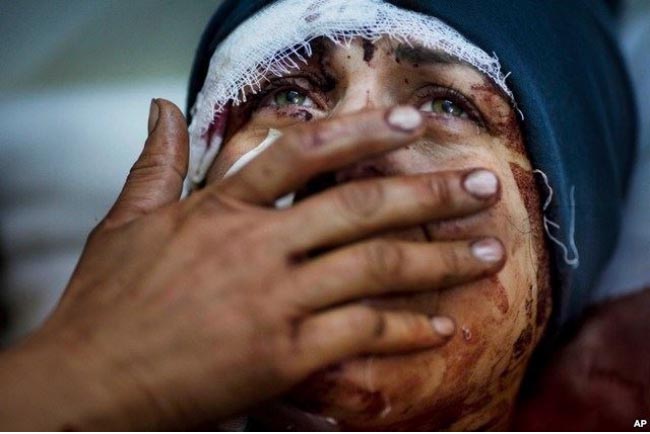A number of individuals suffer from tribal culture which is in conflict with national law. Tribal councils play the role of local government in villages regardless of the Constitution. The local customs that have outweighed religion inflict indescribable sufferings upon some Afghans. Women are particularly left at the mercy of Talibanic mindsets. Violent mentalities hold strong sway in tribal belts and women do not have the right to act or breathe a word against the restrictive culture of their areas.
Throughout the history, Afghan women suffered under patriarchal system and traditional customs. Their rights were violated and their freedoms were curtailed with impunity. Women’ reaction vis-à-vis cultural values ensued death or severe torture. For instance, women’s blood was spilt and their bodies were riddled with guns for transgressing the Taliban’s radical law. Life turned to hell for them since they were treated as mere pariah. There were many stereotypes about them, too. For example, women were considered the element that paved the ground for men’s sin and broke their temptation. Therefore, they were supposed to wear burqa (a head-to-toe covering Afghan women were forced to put on during the Taliban’s regime).
Despite the downfall of the Taliban’s regime and establishment of democratic administration, the sufferings of Afghan women did not end. The Taliban have reportedly killed three women and a child in Sare-pul province last week. Similarly, they killed two persons in desert court on Sunday for allegedly having illegal relations. The Taliban have stoned, killed and tortured people in desert courts in recent years. In addition, the self-proclaimed Islamic State of Iraq and the Levant (ISIL) also tortured Afghan individuals in the worst possible way for one reason or another. Some local mullahs and illegal armed groups resorted to the same action in tribal areas.
The fundamental ideology of the Taliban and ISIL groups, mainly regarding women, is beyond doubt. They seek to impose their warped minds on people with the barrel of gun and radicalize tribal residents. Those who live in the Taliban-dominated areas bear the brunt of their ideology.
Afghanistan’s Constitutions states, “The accused shall be innocent until proven guilty by the order of an authoritative court.” It adds in article 27, “No one shall be pursued, arrested, or detained without due process of law.” However, men and women are killed in cold blood in desert courts without legal process. The militant fighters are widely involved in such issues. The Taliban still consider the current administration “a puppet government” and do not pay significance to Afghanistan’s law.
There are many social, cultural and political barriers before Afghan women. The residents of the tribal belts restrict the rights and liberty of women and reduce their role within the four walls which are contrary to national laws and religious tenets. In other words, the local residents, who nurture tribal traditions, also play highly negative role regarding women’s rights.
Despite democratic administration and immaculate Constitution, the graph of violence against women is on rise. The tragic stories of killing and torturing women, not only by militant outfits but also by their family members, make frequent headlines in national and international newspapers. In fact, women are bleeding as a result of militancy and traditional customs, including parochial mindset. Besides being killed in suicide bombings and terrorist attacks, Afghan women lose their lives in desert courts which are carried out by the same groups. Secondly, domestic violence, too, prevail across the country. This week, a man killed his wife in Helmand province – this is rife in Afghanistan.
Women’s voice in support of their rights fall on deaf ears. There are challenges in government’s apparatus since law is not enforced properly. Years ago, a woman who intended to seek justice in the court was called “prostitute” by a policeman. Moreover, reports said that a number of women that lived behind the bar were simply victims of violence rather than being criminal. On the other hand, some citizens wait in prisons for months and perhaps for years without knowing the reason behind this. To put it succinctly, the law is violated not only by simple individuals or militant groups but also by the officials.
Under-aged marriage is one of the serious issues in Afghanistan and it is considered violence. According to the United Nations, more than 46 per cent of Afghan girls get married under the age of 18, this is not contrary to Afghanistan’s civil law, and more than 15 per cent under the age of 15. Afghanistan’s First Lady Laura Ghani called the early marriage a tragic issue. To prevent from the early marriage, Afghan government has constituted a national working program. This program aims to spread awareness and empower young women.
Two reasons are said to pave the ground for early marriage: poverty and militancy. Indeed, some families force their daughters to marry so that they could mitigate their financial problems. Secondly, insurgency and political turbulence make some families believe that it is hard for them to protect their young daughters against the prevailing ills.
The government must tackle such issues without delay and should have constituted many programs for eradicating violence and empowering women years earlier. Moreover, the clergy and Ulema Council should enlighten the rights and dignity of women based on the true spirit of Islam and the negative aspect of violence.

